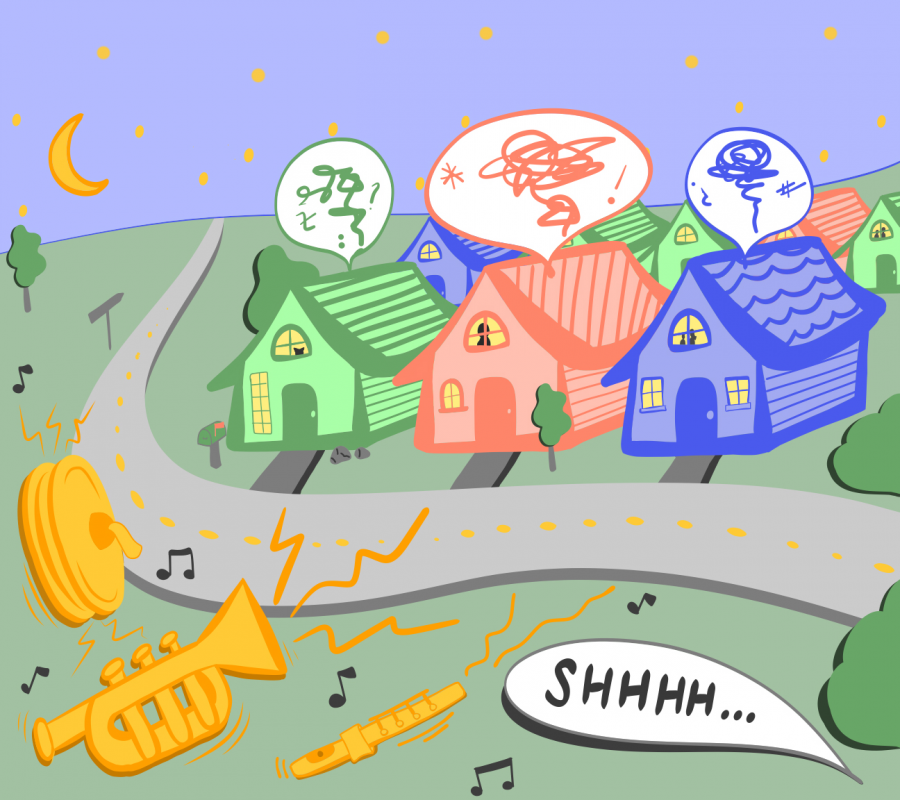Noise, fire safety laws aim to protect Corvallis residents
March 2, 2020
Noise complaints and fire danger are not always at the top of student’s minds as they approach renting an apartment, but following city laws and guidelines can protect new renters from fees and harm.
According to the city of Corvallis Housing and Neighborhood Coordinator Tracy Oulman, ORS 90—the state’s landlord/tenant law—obligates tenants not to infringe on their neighbors’ peaceful enjoyment of their own homes. Corvallis expands on this state law with municipal code Article 5.03.030.
“If amplified sound is audible more than 50 feet from your residence any time of day, then that is a violation of the municipal code,” said Corvallis Police Department Lieutenant and Public Information Officer Dan Duncan. “If you have a big party and you’re playing music loud, it’s not too hard for it to go beyond 50 feet.”
If residents don’t follow noise ordinances, there can be legal consequences.
Duncan explained if the police come to one’s door because of a noise complaint, it is up to the officer to decide the penalty the resident can receive. This can range from a verbal warning to a fine for multiple violations.
While landlords can hold tenants accountable for the noise they produce, they have no power to issue fines based on sound, according to Oulman.
Community livability officers have another way to deal with multiple sound violations that college residents may commit, Oulman said.
“A Special Response Notice is essentially a warning from the Corvallis Police Department for specifically disruptive behaviors,” Oulman said. “They can be minor possession, it can be noise, it can be a nuisance, all kinds of things and if they issue an SRN one of the things that happen is that all the copies of SRN’s go to Oregon State University’s code of conduct office. Then the code of conduct office can reach out to students to follow up. So it’s an important thing to be aware of if you live off-campus.”
While controlling noise is an important factor to make sure students don’t break laws, fire safety laws and guidelines can save lives.
Fire Prevention Chief Jeff Prechel said it is mandatory by law for landlords to have functional fire and carbon monoxide alarms in their buildings. Renters have the responsibility not to tamper or destroy these devices. Preventative measures can also keep students safe from fires.
“One of the most common causes of fire we have here in the city is unattended food on the stove,” Prechel said. “It’s common in rental properties, so if somebody has a fire they should call 9-1-1. One, for the fire department to come out and make sure it’s properly extinguished and two, we can make sure there are no injuries [and] talk to people how to avoid that in the future.”
With the legalization of marijuana at the state level in 2015, there has been a spike in smoking, a common cause of fires, according to Prechel.
“You shouldn’t be smoking inside the building, and a lot of rental agreements will specifically state you can smoke on the property at all, that is the landlord’s right to restrict smoking in their property cause it does cause damage to the property and it’s just risk management,” Prechel said. “If you do smoke, you should have an appropriate place to put your buds, so you should have a metal container with some sand or water.”
Grilling is another safety issue renters should take into account to keep themselves protected, Prechel warned.
“Your grill is supposed to be 10 feet from any combustible materials. You shouldn’t be grilling on any balconies because they can’t get 10 feet from the building. So whether it’s charcoal, gas, there should be no cooking on an exterior balcony,” Prechel said.
Burning one’s trash is also against the law in Corvallis, since it can affect the air quality of one’s neighborhood.
The only burning of materials allowed takes place in a two-week span around April in which yard debris can be burnt, according to Prechel. Burning a large number of organic materials any other time is against the law.
“A lot of the times the issues we find on fires are expressly prohibited in their lease agreements and that creates an issue against the tenants and the landlord after the incident,” Prechel said.
Tenants are responsible for whatever actions their guests or pets take, if laws are broken or fires started, it will be the tenants’ responsibility to deal with them, according to Oulman.
“It is always very good to make sure you have good communication with your property manager, cause there may be municipal codes you need to be aware of but there also may be rules from the property management you need to be aware of as well,” Duncan said.
Renters interested in more information about fire safety can consult the City of Corvallis College Fire Safety webpage.











































































































